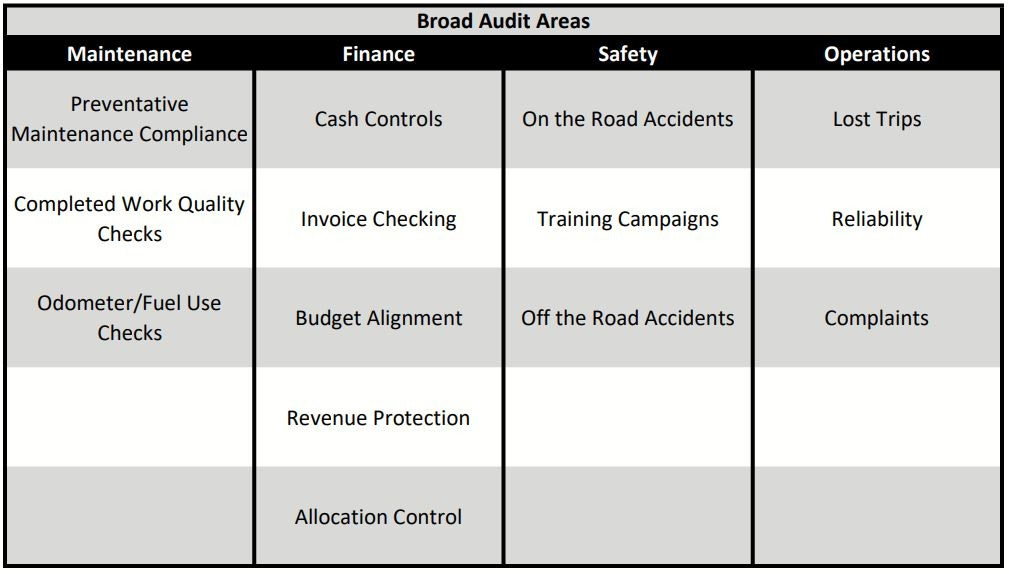Enhancing Busing: The Role of Operational Audits
Operational Audits in Busing
When we hear of audits in our industry, we usually think of safety, financial or external audits being conducted on behalf of, say, a government agency.
Internal Operations Audits in busing tend to be less prevalent, often limited to larger publicly listed companies, transit agencies or companies with strong governance boards.
However, contracts have been revoked and companies have folded due to enforcement actions resulting from a wide range of operations-related shortcomings, as opposed to safety or financial issues.
Examples include poor customer experience that goes uncorrected over time, persistent unreliability, missed trips or reporting deficiencies.
Some of the broad audit areas in busing include Maintenance, Finance, Safety and Operations.

What are Operations Audits?
Operations Audits cover the aspect of ‘what should be done’ at the operations level, effectively checking a process that should be documented.
The Operational Audit is about two things:
Providing the best possible service to the passenger, whether you carry them on a contracted service or not.
De-risking the business from the impact of human nature.
The quality of operational processes can slip through the cracks as other priorities and processes evolve, particularly in scaling businesses. Regular checks are needed to ensure that what we think is happening in our organization is actually happening — and happening well. Give it a score. See if it’s getting better or worse over time. Take action to improve.
The audit list can be limitless, but in this piece, we'll focus on some of the major ones that you should have as a minimum. They account for the highest risks to your business from an operations standpoint and should form a non-negotiable part of your business risk planning and review.
Where to start?
Technically, every process can be audited. Begin by asking about the consequences of not regularly auditing a process. Some processes are more critical than others.
For instance, failing to record and act on lost mileage/trips can have a much bigger implication than, say, accurate complaint logging.
Assign a grade to the important items based on Risk (likelihood) x Impact (severity of consequences). Create a table, similar to that below detailing what you will audit, how severe a risk the processes may be, how you might measure and where you might go to look for the data.

Let’s look at the three categories above in more detail:
Lost Mileage / Lost Trips
Dropping mileage and/or trips puts organic growth in jeopardy and puts contracted services at risk. An audit can include:
Random Road Checks
An auditor can do roadside observations and compare observed service deviations against the records kept back at the garage. Do they match. Why/Why not?
Complaint Sampling
An auditor can examine a sample of complaints and compare to garage operations logs/records.
Do they check out? Are the number of complaints about no-shows disproportionately high and the garage records for missed trips oddly low?
Bus Tracking Reports
Are there gaps in bus tracking data? What accounts for the gaps?
Run Out Sheets
Did each bus working have a vehicle dispatched to it. Are any vehicles listed twice or more? Check against tracking systems.
Reliability
Late, bunched buses, or big service gaps erode customer confidence in the product. There are a multitude of metrics that can be tested. For this piece, I’ve kept it simple with just on-time performance. An audit here can include:
Random Road Checks
Roadside observations again, with cross referencing against garage records can give a sense of garage engagement with conditions and recording of same.
Complaint Sampling
Is there evidence of complaint investigation where reliability is concerned? Are any actions taken beyond complaint response?
Bus Tracking Reports
Are these being reviewed for run times, dwells and on time performance regularly?
Complaints
Complaint handling can feel like a burden on operations staff, but they provide an opportunity to direct focus. Although I rated the complaints handling process a little less severe as the others in terms of risk to the broader business, there are some important processes to be considered to ensure we’re giving ourselves an opportunity to be better. An audit may look at:
Complaints Log
Is there evidence that complaints are being logged and processed cradle to grave?
Are they being properly investigated and is there evidence of action taken where the complaint has merit?
Is response time being recorded and used as a potential improvement metric?
Email/Phone/Chat Systems
Are all contact channels being captured?
It can get very granular and overwhelming quite quick, so it's important to not put off implementation, but rather, start small and build on it. Over time, you'll appreciate what needs to be kept and what can be depreciated.
In summary
As much as infrastructural changes are needed to curb car use and facilitate modal shift, bus operators need to continuously up their game.
A conscientious executive may have all the trust in the world in their staff's capability and may not want to 'rock the boat' by introducing additional audits.
However, failing to regularly monitor high-risk operational items, crucial for business growth and continuity, could ultimately be a disservice to both customers and your employees.

